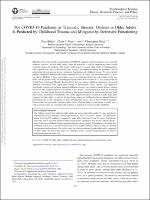Please use this identifier to cite or link to this item:
https://hdl.handle.net/20.500.12202/9453| Title: | The COVID-19 pandemic as traumatic stressor: Distress in older adults is predicted by childhood trauma and mitigated by defensive functioning. |
| Authors: | Békés, Vera Starrs, Claire J Perry, J. Christopher |
| Keywords: | Adverse Childhood Experiences (ACEs). Aged Anxiety Anxiety Disorders COVID-19 Depression Humans Pandemics |
| Issue Date: | 2022 |
| Citation: | Békés, V., Starrs, C. J., & Perry, J. C. (2023). The COVID-19 pandemic as traumatic stressor: Distress in older adults is predicted by childhood trauma and mitigated by defensive functioning. Psychological Trauma: Theory, Research, Practice, and Policy, 15(3), 449–457. https://doi. org/10.1037/tra0001253 |
| Series/Report no.: | Psychological Trauma: Theory, Research, Practice, and Policy;15(3) |
| Abstract: | __Objective:__ It has been broadly anticipated that COVID-19 pandemic-related experiences may constitute traumatic stressors, and that older adults' might be especially at risk of experiencing mental health symptoms during the pandemic. The present study aimed to examine older adults' psychological distress: posttraumatic stress, Covid-related fears, anxiety, and depression during the pandemic, and the relationship between present distress, defensive functioning, and childhood trauma. We also explored potential differences between older adults (between 65 and 74 years), and older-older adults (75 years and above). __Method:__ A large-scale online survey was conducted during the early months of the pandemic, for the present study, we included participants above 65 years old (N = 1,225) mainly from the United States and Canada. __Results:__ Results showed that age, adverse childhood experiences, and overall defensive functioning were significantly related to posttraumatic stress, anxiety, and depression. Specifically, younger age and more reported childhood adversity were related to higher distress, whereas the use of more adaptive defenses was related to less distress. Covid-related fears were not associated with age. Our final model showed that defensive functioning mediated the relationship between childhood trauma and distress. __Conclusions:__ Our results support the relative resilience of older-older adults compared to older adults, as well as the long-lasting impact of childhood adversity through defensive functioning later in life, specifically in times of heightened stress, such as the COVID-19 pandemic. Future studies are warranted to identify further factors affecting defensive functioning as adults age, as well as processes that are associated with resilience in response to stressors in older adulthood. (PsycInfo Database Record (c) 2023 APA, all rights reserved). |
| Description: | Scholarly article / Open access |
| URI: | https://hdl.handle.net/20.500.12202/9453 |
| Appears in Collections: | Ferkauf Graduate School of Psychology: Faculty Publications |
Files in This Item:
| File | Description | Size | Format | |
|---|---|---|---|---|
| Bekes 2022 OA The COVID-19 pandemic-57827-001.pdf | 318.43 kB | Adobe PDF |  View/Open |
This item is licensed under a Creative Commons License

